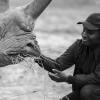I am Sherril Phyllis Masudi, a veterinarian who is very passionate about environmental conservation and its impact on people’s health and livelihood, animal, and ecosystem health. I am a One Health enthusiast and I strongly believe that concerted multidisciplinary efforts are effective in ensuring optimal human, animal and environmental health and well-being. As such, I have always engaged in research that employs the One Health Concept. I am a National Geographic Explorer, and currently a PhD candidate at the Wageningen University and Research, hosted at the Animal and Human Health Department at the International Livestock Research Institute, Kenya. My PhD project, supported by the GIZ’s International Alliance against Health Risks in Wildlife Trade, aims at establishing the risk of exposure to pathogens to people who engage in the illegal wild meat trade in the Nairobi Metropolis, Kenya. This project is the first to uniquely address the illegal, intricate, unsustainable and health threatening wild meat trade in Kenya. Findings from my PhD project will help inform policy formulation towards global health security.
During my Master’s project (Funded by the National Geographic Society), I assessed the interactive effects of cattle and wild herbivores on pasture quality and quantity in an East African Savanna Ecosystem. This was done at the Mpala Research Centre, Nanyuki, Kenya. However, due to the SARS-COV2 pandemic, I was not able to disseminate my study findings to the local communities on time. Local communities would benefit a lot from our study recommendations as they are pastoralist, depending on the ecosystem for daily livelihood. It was until I got a grant from ARM, in collaboration with WildLabs, Flora and Fauna and Ol Pejeta, that I was able to accomplish data dissemination for my project.
I designed a brochure in Swahili to help shed more light on the impact of grazing and pasture burning on forage quality and quantity among communities in two arid and semiarid areas in Kenya. First, the brochures were designed in English, and then translated in Swahili. I used pictorials and images to ease understanding of my study findings in these communities mostly dominated by illiterate decision makers i.e. the older members of the community and leaders. I visited livestock market areas and homesteads in the pastoral areas in Kenya where I distributed these brochures, also explaining their contents to participants. Most pastoral communities in Kenya live in remote areas, that are, not so often, accessible for data dissemination. It was therefore a privilege for achieving this through funding from ARM through Women in Conservation Technology program, Kenya.
Conservation in Kenya requires a more targeted, multidisciplinary and multisectoral efforts to address cross-cutting challenges on human, animal, and environmental health. As a veterinarian, I have and continues to use my veterinary background to conduct research that inform conservation policies towards achieving optimal human, animal, and environmental health. Giving feedback in these areas is one step ahead into making data from science useful. My masters project particularly contributes to conservation by providing evidence-based data on proper application of fire and grazing regime for effective pasture management, consequently improving animal productivity and people’s wellbeing. While I am currently on a slightly different project, I am open to all research opportunities and collaborations in the field ecology, conservation, and public health.



Add the first post in this thread.